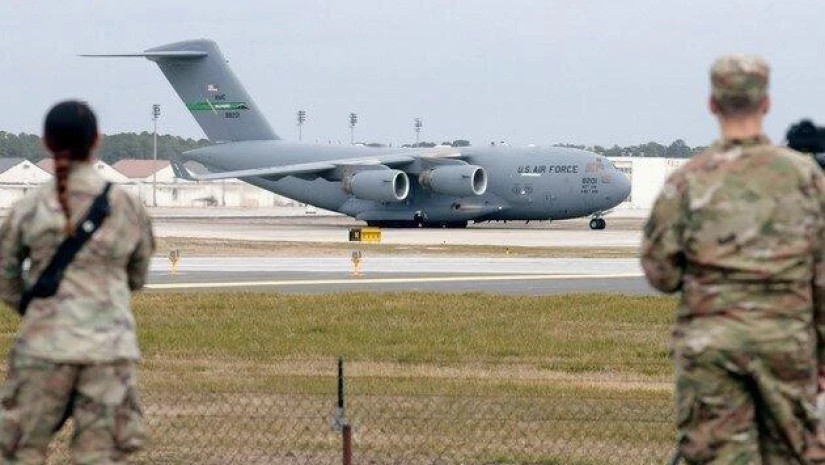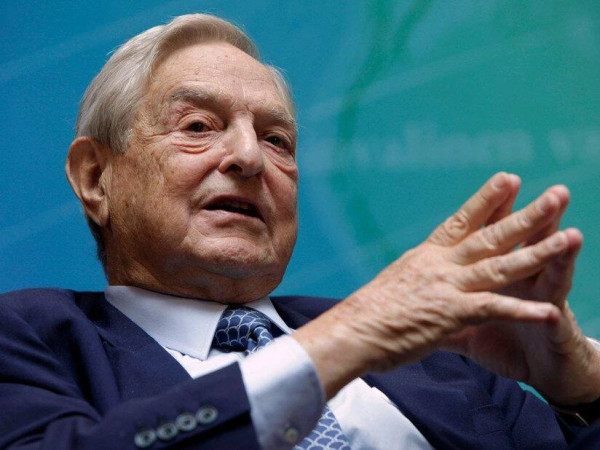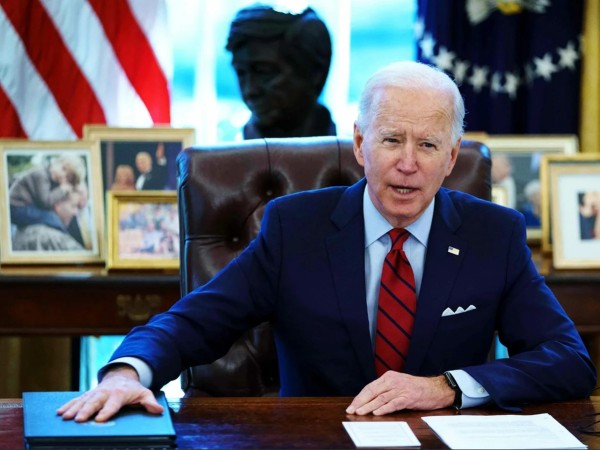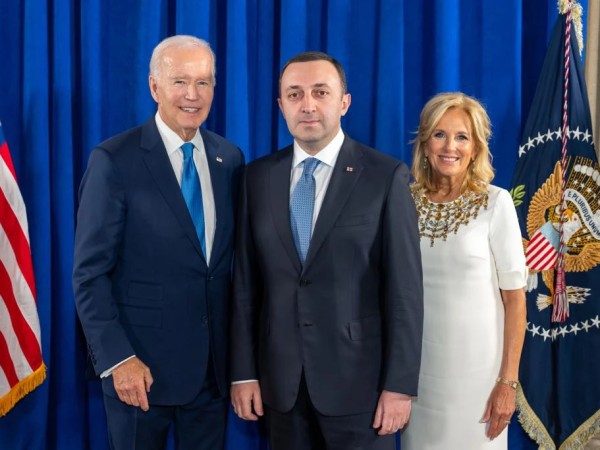As Russian leader Vladimir Putin moves troops into Ukrainian territory and launches a wider invasion of the country, President Joe Biden is responding with words of condemnation, economic sanctions and efforts to rally U.S. allies to stand up to Moscow.
But one option Biden remains unwilling to use is sending American troops to fight Russian forces in Ukraine.
Biden is so dead set on avoiding the possibility of a U.S.-Russian military encounter that he pulled out of Ukraine scores of U.S. troops who had been training that country’s fighters. He also recently warned that he won’t send U.S. troops to evacuate Americans stuck in Ukraine, citing the risk of a clash.
“That’s a world war when Americans and Russia start shooting at one another,” Biden explained in an interview that aired earlier this month with NBC News’ Lester Holt. “We’re in a very different world than we’ve ever been.”
On Tuesday, as he laid out the first major tranche of U.S. sanctions on the Kremlin for its invasion, Biden once again stressed: “These are totally defensive moves on our part. We have no intention of fighting Russia.”
Polling supports the sense that the U.S. public is reluctant to get involved in a shooting war in Europe over a country few Americans can find on a map. Russia and the United States both are nuclear powers, adding to fears of escalation.
But Biden’s position also raises the question: Would Putin have made different calculations in Ukraine this week if Biden had raised the possibility he would deploy American troops? Or should Biden have stayed mum about what he’d do — adopting a strategically ambiguous position that could have deterred Putin?
Critics of Biden’s stance say it’s impossible to assess exactly what alternative history might have transpired had Biden kept alive the military option. Putin has, after all, had a presence inside Ukraine since 2014, when he first invaded, and he appears intent on taking more of the country.
But the Russian leader’s takeaway from Biden’s unwillingness to deploy troops is that he can get away with a lot, some critics argue, and China is learning the same as it weighs how to deal with Taiwan.
“The message we’re sending Russia by rushing U.S. troops out of [Ukraine and] closing the embassy is that we’re afraid of getting into a conflict with any Russians,” said Kori Schake, director of foreign and defense policy studies at the American Enterprise Institute, who criticized Biden’s stance in a searing op-ed earlier this month.
Add to Biden’s reticence on Ukraine his withdrawal of U.S. troops from Afghanistan, and China’s communist leaders will believe “that we’re not willing to fight for anything,” Schake said in an interview.
Biden and his aides are aware of such critiques. But when asked if Putin’s moves have sparked a rethink or grumbling within the administration about Biden’s stance, they are blunt in their replies.
“No,” one senior administration official said.
“Absolutely not,” a Pentagon official added. “No one wants to risk nuclear war with Russia over Ukraine.”
The table, and the options
There’s no indication that sending U.S. troops to fight in Ukraine was ever a serious subject of discussion within the Biden administration, although there were reports that U.S. officials pondered whether to send military advisers to the country. “Military adviser” is a flexible term in the Pentagon’s lexicon that can mean active duty servicemembers or reservists offering battlefield assistance or training; often, the advisers are Green Berets.
In November, a top State Department official used the classic phrase many American leaders turn to when hinting that potential military force is under consideration.
“As you can appreciate, all options are on the table, and there’s a toolkit that includes a whole range of options,” said Karen Donfried, assistant secretary of State for European and Eurasian affairs.
In December, however, Biden said flatly “that is not on the table” when asked if he was considering deploying U.S. troops in Ukraine, and his aides have echoed him in public in the days since.
Aside from worries of a nuclear war, U.S. officials privately point to other reasons to avoid deploying troops in Ukraine, chief among them that the United States has no treaty responsibilities to Ukraine or critical national security interests at stake there. Ukraine isn’t located along America’s border, it doesn’t host U.S. military bases and it’s not a major trade partner, among other reasons.
Those explanations, however, have not stopped the United States from using its military might on behalf of others in the past.
During the George H.W. Bush administration, the U.S. rallied other countries to push Iraq’s Saddam Hussein out of Kuwait, despite having no treaty obligation to that small country; Washington’s interests at the time included protecting oil and gas production in the Middle East.
During the Barack Obama administration, the United States intervened militarily in Libya to stop dictator Moammar Gadhafi from attacking the rebel-held city of Benghazi, an operation justified primarily on human rights grounds.
Biden’s views on American intervention have evolved toward greater caution during his many decades in the public eye.
In the 1990s, as a senator, he supported using U.S. force to quell ethnic fighting in the Balkans. But, thanks in part to U.S. struggles in Afghanistan and Iraq, he has become far more wary of deploying American military power.
As Obama’s vice president, for instance, he opposed the intervention in Libya, saying the United States had no major strategic interests there. In subsequent years, he pointed to the chaos in the country as proving him right.
Biden likewise was strongly opposed to Obama’s surge of U.S. troops in Afghanistan, advocating a narrower counterterrorism footprint. In that 20-year conflict, he inherited the role of ultimate decision-maker, ordering U.S. forces out of Afghanistan last year. He has defended the decision despite the chaos that ensued, including a bombing that killed 13 U.S. servicemembers and scores of Afghans in Kabul.
What Biden has done, administration officials note in defending his position, is sent or repositioned thousands of additional troops to NATO countries near Ukraine. Those troop deployments are designed to deter Putin from thinking he can take his war beyond Ukraine and into NATO countries, which the United States has a treaty obligation to defend.
Biden also has increased U.S. economic and military aid to Ukraine, sending missiles, ammunition and equipment, in hopes of giving it a fighting chance against Russia’s superior military.
His administration’s diplomatic efforts on behalf of Ukraine have even led some Asian countries to express disapproval toward Russia. Japan this week said it would impose sanctions on Moscow.
China, meanwhile, has criticized the sanctions on Russia and the idea of NATO expansion even though it has, for now, stayed away from endorsing Moscow’s move into eastern Ukraine. Beijing likely sees the global community’s reaction to Russia’s invasion of Ukraine as a potential pattern that could result should China try to take over Taiwan.
The United States has long maintained a policy of “strategic ambiguity” toward Taiwan, meaning it will not say whether it will intervene militarily to help the island defend itself against a takeover attempt by China. At the same time, the U.S is a major supplier of weapons and other military equipment to the Taiwanese.
Biden last year appeared to suggest that the United States would come to Taiwan’s defense if it were attacked. The White House insisted Biden had not meant to signal any change in the strategic ambiguity policy. But the kerfuffle led to calls for Washington to adopt a clearer position on what it would do for Taiwan, especially as China ramps up aggressive moves toward the island.
Tricky American politics
When it comes to Ukraine, another, less publicly acknowledged factor is driving the administration’s aversion to using troops: The domestic politics are dicey.
Polls suggest there’s little appetite among Americans to enter another war, especially after the bloody U.S. experience in Afghanistan, which ended with Taliban militants taking over the country.
Biden’s position on Ukraine has earned sympathy from not just fellow Democrats but even Republicans who are well aware of the public mood. Some elements of the GOP base, pushed by conservative Fox News host Tucker Carlson, are even siding with Russia against Ukraine, adding to the bizarre nature of the political debate.
Sen. Marco Rubio (R-Fla.), who is generally hawkish on foreign policy and often criticizes the Biden team, on Tuesday dismissed the idea of sending U.S. troops to Ukraine, saying “war between the U.S. and Russia is not going to be good for anybody.”
“These are the world’s two largest nuclear powers, and that’s one of the things — even as we are firm in our response — [that] we have to try everything possible to avoid, because it can escalate very quickly,” Rubio said on CBS. “We’re not the world’s policemen. We’re not sending troops into Ukraine.”
While Rubio’s view is a common one on the left and right, there are some lawmakers troubled by Biden’s inflexibility on the issue of troops.
“Strong presidents never take options off the table, and we cannot be surprised if Putin now doubts whether we really care what he does to Ukraine,” GOP Sen. Roger Wicker of Mississippi wrote in the National Review last week.
In a sign of how fraught the politics can be, more than 40 lawmakers representing both parties wrote to Biden this week insisting that, if he decides he wants to send troops to Ukraine, he bring the matter to Congress first.
“The American people, through their representatives in Congress, deserve to have a say before U.S. troops are placed in harm’s way or the U.S. becomes involved in yet another foreign conflict,” the lawmakers wrote.
The long game
One U.S. official familiar with the issue said that within the administration, there’s ongoing worry about the possibility that the standoff between the United States and Russia could escalate even if American troops aren’t in Ukraine.
That could happen if American citizens in Ukraine are killed, if Russia uses cyber attacks to retaliate against U.S. sanctions or if Russian troops even accidentally fire across the border into a NATO country, the official said.
The level of American involvement in Ukraine could vary depending on how long the conflict lasts and who’s in charge at the White House.
Many officials and analysts suspect Putin plans to go big, trying to grab as much of the country as possible. That’s led to the distinct possibility that Washington might aid a Ukrainian insurgency, especially if Russia’s military takes all or much of Ukraine.
The United States has a track record on this front, in, of all places, Afghanistan.
During the 1980s, Washington armed and funded Afghan rebels trying to push the Soviet Union out of their country. The Soviets eventually left, but the violence in the country didn’t stop as Afghan militias turned on each other, eventually giving rise to the Taliban.
Funding and arming Ukrainian insurgents is the type of plan that could get significant support in Congress, but it’s also an effort that requires patience and long-term thinking.
A new president could also upend the plans.
Biden’s predecessor in the White House, Republican Donald Trump, tried repeatedly to gain favor with Putin, even though his administration — thanks in part to congressional legislation — imposed tough sanctions on Russia over a variety of complaints.
Trump also tried to pressure the Ukrainian government into investigating Biden, an effort that led to his first impeachment and subsequent acquittal. In various statements this week, Trump has said Russia would not have invaded Ukraine if he was president, while also describing Putin’s moves as “savvy” and “genius.”
Whether Trump, Biden or someone else is in charge in Washington in 2025, one person with a long-term view is Putin, who plans to stay in power for many more years.
Source: Politico















